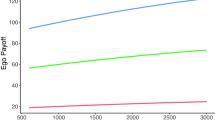Abstract
Following Fehr and Gäechter (Am Econ Rev 90(4):980–994, 2000), a large and growing number of experiments show that public goods can be provided at high levels when mutual monitoring and costly punishment are allowed. Nearly all experiments, however, study monitoring and punishment in a complete network where all subjects can monitor and punish each other. The architecture of social networks becomes important when subjects can only monitor and punish the other subjects to whom they are connected by the network. We study several incomplete networks and find that they give rise to their own distinctive patterns of behavior. Nevertheless, a number of simple, yet fundamental, properties in graph theory allow us to interpret the variation in the patterns of behavior that arise in the laboratory and to explain the impact of network architecture on the efficiency and dynamics of the experimental outcomes.
Similar content being viewed by others
References
Anderson C, Putterman L (2005) Do non-strategic sanctions obey the law of demand? The demand for punishment in the voluntary contribution mechanism. Games Econ Behav 54(1): 1–24
Carpenter J (2007) Punishing free-riders: how group size affects mutual monitoring and the provision of public goods. Games Econ Behav 60(1): 31–51
Carpenter J, Matthews P (2009) What norms trigger punishment?. Exp Econ 12(3): 272–288
Cinyabuguma M, Page T, Putterman L (2005) Cooperation under the threat of expulsion in a public goods experiment. J Publ Econ 89(8): 1421–1435
Fehr E, Gächter S (2000) Cooperation and punishment in public goods experiments. Am Econ Rev 90(4): 980–994
Jackson M (2008) Social and economic networks. Princeton University Press, Princeton
Kosfeld M (2004) Economic networks in the laboratory: a survey. Rev Netw Econ 3(1): 20–41
Ledyard J (1995) Public goods: a survey of experimental research. In: Kagel J, Roth A (eds) The handbook of experimental economics. Princeton University Press, Princeton, pp 111–194
Masclet D, Noussair C, Tucker S, Villeval M-C (2003) Monetary and nonmonetary punishment in the voluntary contributions mechanism. Am Econ Rev 93(1): 366–380
Nikiforakis N (2008) Punishment and counter-punishment in public goods games: can we still govern ourselves?. J Publ Econ 92(1–2): 91–112
O’Gorman R, Henrich J, Van Vugt M (2009) Constraining free riding in public goods games: designated solitary punishers can sustain human cooperation. Proc R Soc B 276: 323–329
Author information
Authors and Affiliations
Corresponding author
Additional information
Some of the results reported here were previously distributed in a paper titled “Network Architecture and Mutual Monitoring in Public Goods Experiments.” This research was supported by the Center for Experimental Social Sciences (CESS) at New York University and the UC Berkeley Experimental Social Science Laboratory (Xlab). We are grateful to Jim Andreoni, Boğaçhan Çelen, Andreas Fuster, Tom Palfrey, Matthew Rabin, and Bertil Tungodden for helpful discussions. The paper has benefited from suggestions by the participants of seminars at several universities. Kariv and Carpenter are grateful for the hospitality of the School of Social Science in the Institute for Advanced Studies at Princeton and Institute for the Study of Labor (IZA), respectively. Lastly, while we all share the credit that this research may be due, one of us does not share any blame because he had no idea that the paper had been submitted to this festschrift, commemorating his 65th birthday.
Rights and permissions
About this article
Cite this article
Carpenter, J., Kariv, S. & Schotter, A. Network architecture, cooperation and punishment in public good experiments. Rev Econ Design 16, 93–118 (2012). https://doi.org/10.1007/s10058-012-0120-z
Received:
Accepted:
Published:
Issue Date:
DOI: https://doi.org/10.1007/s10058-012-0120-z




